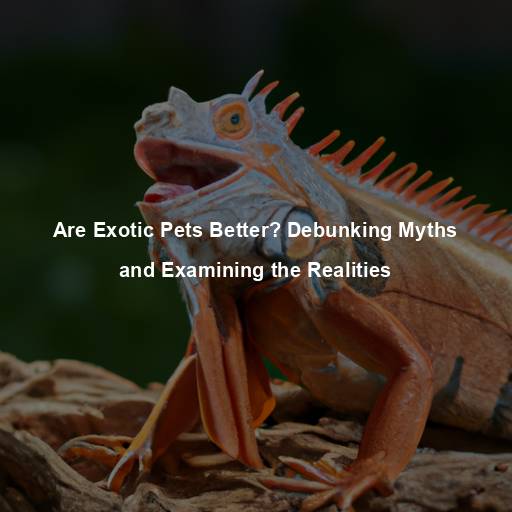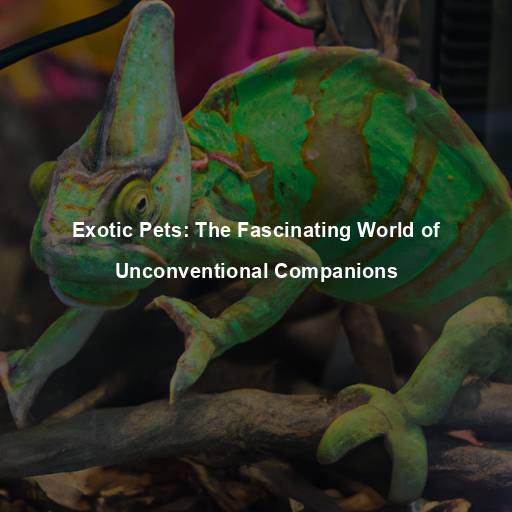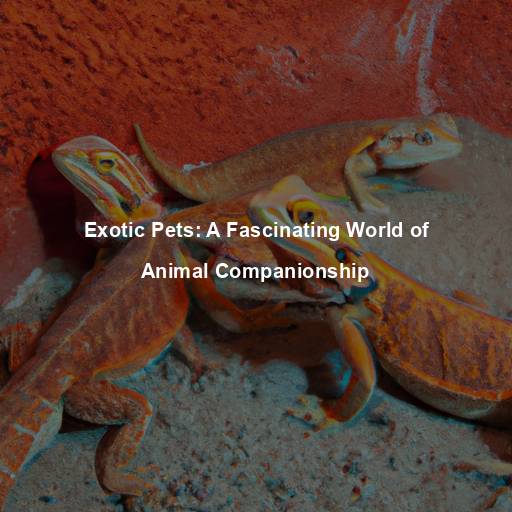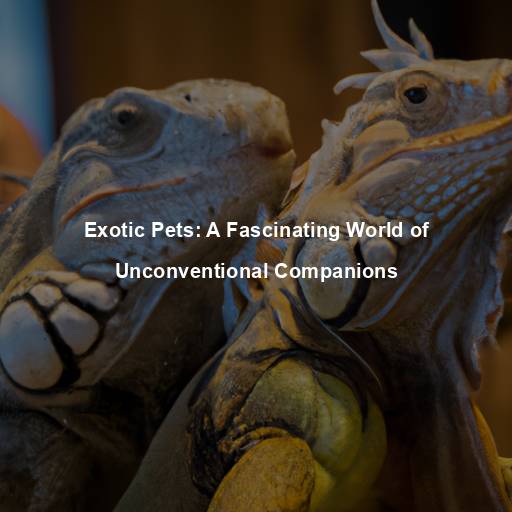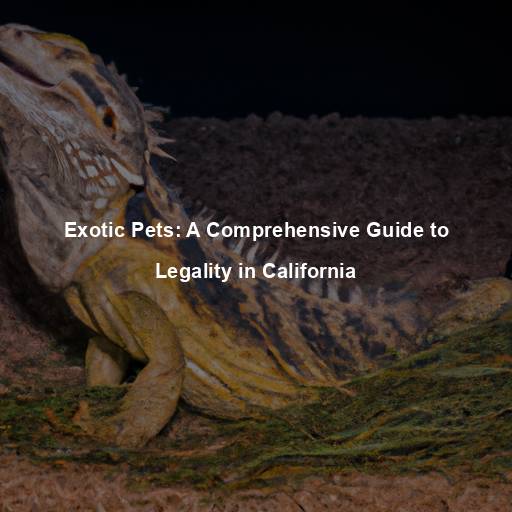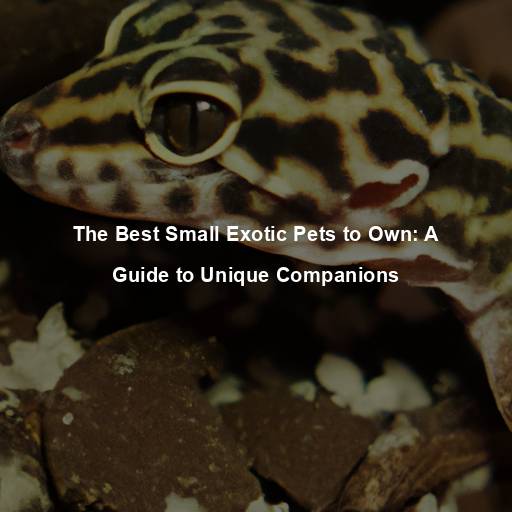Are Exotic Pets Better? Debunking Myths and Examining the Realities
Last Updated on July 17, 2023 by Evan
Contents
- 1 The Fascination with Exotic Pets
- 2 Myth vs. Reality: The Pros and Cons of Exotic Pets
- 3 The Legal and Ethical Considerations of Exotic Pet Ownership
- 4 The Reality of Exotic Pet Ownership
- 5 Responsible Breeding and Adoption
- 6 The Impact on Ecosystems and Biodiversity
- 7 The Human-Animal Bond
- 8 The Role of Regulations and Advocacy
- 9 Responsible Ownership Practices
- 10 Public Safety and Exotic Pet Ownership
- 11 The Ethical Dilemma: Captivity vs. Conservation
- 12 Final Thoughts: A Balanced Approach
- 13 FAQs – Are Exotic Pets Better?
- 13.1 What are exotic pets?
- 13.2 Are exotic pets better than traditional pets like dogs or cats?
- 13.3 What are the advantages of keeping an exotic pet?
- 13.4 What are the challenges of owning an exotic pet?
- 13.5 Are exotic pets suitable for everyone?
- 13.6 Should one choose an exotic pet solely based on their appearance?
- 13.7 How can one ensure the welfare of an exotic pet?
The Fascination with Exotic Pets
Exotic pets have always captured our imaginations. From tigers and pythons to monkeys and parrots, the allure of owning a unique and exotic creature is undeniable. But before you rush off to buy that baby sloth or pet lion, it’s essential to separate fact from fiction. In this article, we’ll explore the common misconceptions surrounding exotic pets and shed light on the realities of owning these extraordinary creatures.
Understanding Exotic Pets
Have you ever considered keeping an exotic pet? These captivating creatures from far-flung lands bring an air of enchantment to any household. With their distinct allure and uncommon traits, they effortlessly distinguish themselves from the usual domesticated companions. However, it is crucial to approach the idea of owning an exotic pet with both caution and curiosity, as the line between legality, responsibility, and potential hazards can appear bewilderingly blurry.
Myth vs. Reality: The Pros and Cons of Exotic Pets
Myth: Exotic Pets are More Exciting and Unique
Reality: It’s undeniable that owning an exotic pet can be an exhilarating experience. The novelty of having a creature that stands out from the ordinary can be a source of pride and fascination. However, it’s crucial to consider the practicalities and responsibilities that come with owning an exotic pet. They often require specialized care, habitat, and diet, which can become overwhelming for inexperienced owners.
Myth: Exotic Pets are Easier to Care for
Did you know that the care and keeping of exotic pets is far from a walk in the park? It’s time to bust a popular myth: these fascinating companions are not necessarily easier than your average household pet. In fact, their unique needs can sometimes leave even the most experienced pet owners scratching their heads. Take reptiles, for instance.
Myth: Exotic Pets are Low-Maintenance
Owning an exotic pet brings with it a whirlwind of unique challenges. The demanding dietary requirements alone can leave even the most dedicated pet owners feeling perplexed and scrambling to find the right ingredients. Plus, let’s not forget the hunt for a knowledgeable veterinarian who can navigate the complexities of treating these extraordinary creatures. The reality is, the path to providing optimal care for your exotic companion can be a rollercoaster ride of burstiness and unexpected twists.
Myth: Exotic Pets Make Great Conversation Starters
It’s no secret that having an exotic pet can catapult you into the realm of the extraordinary. The allure of being the cynosure of all eyes is undeniable. Yet, amidst the captivating eccentricity, one must pause for a moment of profound reflection. By embracing the allure of exotic pets as a mere means of attracting conversations, we inadvertently plunge into a murky world of ethical perturbations.
The Legal and Ethical Considerations of Exotic Pet Ownership
The Legal Landscape
Laws regarding exotic pet ownership vary widely depending on the country and region. Some countries, like the United States, have federal laws governing the ownership of certain exotic species, while others delegate regulations to individual states or provinces. It’s essential to research and abide by local laws to ensure legal and responsible ownership.
Ethical Concerns
Owning an exotic pet raises ethical questions regarding animal welfare and conservation. Many exotic animals are captured from their natural habitats or bred in captivity under questionable conditions. The demand for these creatures as pets fuels the illegal wildlife trade, which often involves cruelty and unsustainable practices. Responsible ownership involves supporting conservation efforts, adopting from reputable breeders, and providing proper care and enrichment for the animal.
The Reality of Exotic Pet Ownership
Specialized Care and Expertise
Taking on the responsibility of owning an exotic pet is a venture filled with perplexity and wonder. It is an endeavor that demands a burst of dedication, both in terms of time and exuberant efforts. These extraordinary creatures come with a plethora of distinctive needs, requiring a mosaic of specialized enclosures, personalized diets, and specialized veterinary care. Thoroughly delving into the captivating world of research and comprehending the peculiar requisites of the particular species you have set your heart upon is pivotal in ensuring their happiness and overall thriving.
Financial Considerations
Owning exotic pets might seem like an enchanting adventure at first, but it’s important to consider the financial commitment involved. The expenses are not limited to the initial purchase, but rather a constant stream of costs including housing, nutrition, stimulating activities, and medical attention. Furthermore, the unpredictability of unforeseen health issues or the demand for specialized treatments can leave pet owners in a perplexing state. Consequently, before diving into the extraordinary realm of exotic pets, potential guardians must meticulously assess their financial capacities to avoid any financial burstiness.
Long-Term Commitment
Have you ever thought of having an unconventional pet? Well, some of these exotic creatures can live longer than the average fluffy companion we’re used to. However, before you venture into owning an exotic animal, it’s essential to ponder the magnitude of the long-term commitment that comes with it. Can you confidently promise the love, care, and attention this unique being requires throughout its entire existence?
Conservation and Education
While owning an exotic pet can be a rewarding experience, it’s important to remember that these animals belong in their natural habitats. Supporting conservation efforts and educational initiatives can be a more ethical way to appreciate and learn about exotic animals. Zoos, wildlife sanctuaries, and educational programs provide opportunities to observe and interact with these creatures while promoting their conservation in the wild.
Understanding the Species
When it comes to contemplating the addition of an unconventional companion, the road to adoption must be paved with diligent investigation. Each extraordinary creature possesses a myriad of idiosyncrasies, necessitating an in-depth exploration prior to commitment. The intricate tapestry of their habits, preferred environment, and dietary preferences must be unraveled to ensure their welfare in confinement.
Consultation with Experts
When it comes to owning exotic pets, it’s wise to tap into the wisdom of seasoned experts. With their extensive knowledge, veterinary professionals specializing in the care of these unique creatures can offer priceless advice and guidance. Don’t hesitate to reach out to reputable breeders, wildlife sanctuaries, and organizations dedicated to the well-being of exotic animals—they can provide valuable insights that will help you make an informed decision.
Responsible Breeding and Adoption
Ethical Breeders
If you decide to obtain an exotic pet through a breeder, it is crucial to choose a reputable and ethical one. Responsible breeders prioritize the well-being of their animals, provide proper care, and work towards preserving the genetic health of the species. They should be transparent about their breeding practices and willingly share information about the parents’ lineage and health history.
Adoption and Rescue
Finding the perfect companion doesn’t always mean sticking to conventional choices. For those seeking a touch of the extraordinary, why not explore the world of exotic pets? From rescued animals finding solace in sanctuaries to those seeking new homes after tumultuous pasts, adopting an exotic pet opens up a realm of compassion and contributes to the preservation of various species. By forging this unconventional bond, you become part of a vital effort to protect and nurture our diverse wildlife populations.
The Impact on Ecosystems and Biodiversity
Invasive Species
When it comes to owning exotic pets, there’s a whole world of complexity and uncertainty that we need to delve into. One major concern that sends a shiver down the spine is the possibility of introducing invasive species into unfamiliar territories. Picture this: an exotic pet escapes or is deliberately set free, wreaking havoc on the delicate balance of local ecosystems and putting native plants and animals at risk. The repercussions of such invasive species are nothing short of catastrophic, making responsible ownership and stringent prevention measures an absolute must.
Conservation Efforts
It’s truly fascinating how the devotion of exotic pet enthusiasts can intertwine with the greater cause of conservation. It’s a perplexing notion that by aligning oneself with reputable organizations committed to the protection of wildlife, one can actively contribute to the preservation of endangered species and their precious habitats. With a burst of financial contributions, volunteering, and active participation in educational programs, the impact on the well-being of these extraordinary creatures in their natural habitats becomes all the more profound. Let us embark on this captivating journey of intertwining passion and conservation, for a world where exotic animals thrive.
The Human-Animal Bond
Unique Connections
The allure of exotic pet ownership lies in the promise of an extraordinary and unparalleled connection with these captivating creatures. These non-traditional companions possess the ability to forge profound and unbreakable bonds with their human caretakers, offering not only companionship but also a wellspring of emotional nourishment. Nonetheless, it is crucial to acknowledge that the dynamics of these relationships diverge significantly from those found in more conventional pet-owner dynamics.
Challenges and Responsibilities
Building a strong bond with an exotic pet requires patience, understanding, and consistent care. These animals may have specific behavioral needs or exhibit natural instincts that can be challenging to manage. It is crucial to be prepared for the potential challenges that come with exotic pet ownership and be willing to invest the time and effort required to nurture the bond.
The Role of Regulations and Advocacy
Stricter Regulations
In the ever-evolving landscape of pet ownership, a paradigm shift has emerged. Society, enigmatic as it may be, has begun to sense the importance of regulating the ownership of exotic pets. As this realization dawns upon us, certain countries and states have embarked on a journey to enforce more stringent laws that safeguard not only these extraordinary creatures but also the public. The underlying objectives of these regulations are multifaceted – curbing the illegal wildlife trade, fostering a culture of responsible pet ownership, and safeguarding the well-being of these captivating animals.
Advocacy for Responsible Ownership
Advocacy groups and organizations dedicated to exotic animal welfare play a vital role in promoting responsible ownership and educating the public. They work towards raising awareness about the challenges and responsibilities associated with exotic pets. By supporting these organizations, you contribute to the dissemination of accurate information and the protection of exotic animals.
Mental Stimulation and Enrichment
In the captivating world of exotic pets, where the line between captivity and freedom is blurred, mental stimulation reigns supreme. These enigmatic creatures yearn for a life immersed in a tapestry of mind-boggling adventures, necessitating an intricate balance of physical exertion, sociability (if their nature allows), and cognitive puzzles. Picture puzzle toys that boggle the mind, tantalizing foraging opportunities that unveil a trove of hidden treasures, and meticulously crafted habitats that transport them to the wilderness they once called home – the realm of enrichment knows no bounds.
Veterinary Care
When it comes to taking care of our beloved exotic pets, we all want the best for them. But how do we ensure their health and well-being? The answer lies in finding a knowledgeable veterinarian who specializes in exotic animal medicine. These experts are equipped with the expertise needed to provide regular check-ups, monitor their health, and administer crucial vaccinations and treatments.
Responsible Ownership Practices
Education and Preparation
Responsible ownership of exotic pets begins with thorough education and preparation. Researching the specific needs, requirements, and potential challenges of the species you are interested in is crucial. Understanding their dietary needs, habitat requirements, and potential health issues will help you provide appropriate care and ensure the well-being of the animal.
Secure Enclosures
Exotic pets often require specialized enclosures that meet their unique needs. This includes providing appropriate space, proper ventilation, temperature and humidity control, and escape-proof barriers. Ensuring the enclosure is secure and safe not only protects the animal but also prevents potential harm to humans and the surrounding environment.
Socialization and Training
For species that are social or trainable, socialization and training are vital aspects of responsible ownership. Exotic pets that benefit from social interaction should be provided with appropriate opportunities to engage with their own species or, if suitable, with their human caregivers. Training can help establish desired behaviors, facilitate handling for veterinary care, and enhance the bond between the pet and the owner.
Public Safety and Exotic Pet Ownership
Potential Risks
Owning exotic pets can be an alluring adventure, full of excitement and wonder. However, it’s important to tread carefully as these captivating creatures can sometimes prove to be challenging companions. With their instinctive behaviors and unpredictable nature, these uncommon pets have the potential to cause mishaps or even harm to the unprepared. Therefore, it is crucial to educate oneself about the hidden risks that come hand-in-hand with the ownership of such magnificent beings and implement suitable measures to minimize any potential dangers.
Responsible Interaction
When it comes to exotic pets, maintaining public safety should be a top priority for responsible owners. This means taking necessary precautions such as using harnesses, leashes, or secure enclosures when venturing out in public. Additionally, educating family, friends, and even visitors on the appropriate ways to engage with these unique companions can play a significant role in ensuring the well-being of all involved. This harmonious coexistence may seem perplexing at times, but it’s an essential aspect of being a responsible exotic pet owner.
The Ethical Dilemma: Captivity vs. Conservation
Captivity for Conservation?
One of the ongoing debates surrounding exotic pet ownership is the ethical dilemma of keeping these animals in captivity for conservation purposes. While some argue that captive breeding programs can help preserve endangered species and prevent their extinction, others believe that the natural habitat is the best place for these animals to thrive. It is essential to weigh the potential benefits against the ethical considerations and ensure that conservation efforts prioritize the long-term survival of the species in their natural environments.
Supporting Conservation Initiatives
Whether or not you choose to own an exotic pet, supporting conservation initiatives is crucial for the long-term survival of endangered species. Contributing to conservation organizations, participating in habitat restoration projects, and spreading awareness about the importance of preserving biodiversity can all make a positive impact.
Final Thoughts: A Balanced Approach
When it comes to owning exotic pets, let’s dive into the realm of balanced perspectives and nuanced decisions. The welfare of these amazing creatures, responsible ownership practices, public safety, and ethical considerations all deserve a spot on our perplexing checklist. To navigate this intricate terrain, thorough research, education, and expert consultations become our guiding lights, illuminating a path towards well-informed choices. Buckle up, because this judgment call is bursting with complexity!
As pet enthusiasts, we have a profound responsibility to ensure that our furry friends receive the utmost care and attention. This means going beyond the basics of feeding and shelter, and truly understanding the specific needs of each unique species. By taking the time to educate ourselves and supporting conservation efforts, we can contribute to the preservation of these extraordinary animals. Together, let’s embrace responsible ownership, elevate our knowledge, and make a positive impact on the lives of these captivating creatures.
FAQs – Are Exotic Pets Better?
What are exotic pets?
Exotic pets refer to animals that are not commonly kept as pets and usually originate from more remote regions of the world. Examples of exotic pets include reptiles like snakes, lizards, and turtles, as well as birds such as parrots, and small mammals like hedgehogs or sugar gliders.
Are exotic pets better than traditional pets like dogs or cats?
When it comes to choosing between exotic pets and traditional pets, there’s no simple answer. It all boils down to personal preferences, lifestyle, and the ability to meet the needs of the animal in question. Exotic pets offer a sense of novelty and curiosity, but they also come with a whole package of specialized care, housing, and dietary requirements. On the other hand, traditional pets have been domesticated over many generations, meaning they often demand less specialized attention. Ultimately, the decision should be based on factors like your passion for the unusual, the time you can devote to a pet, and your knowledge about their unique needs.
What are the advantages of keeping an exotic pet?
One of the advantages of having an exotic pet is the excitement and novelty they can bring to your life. These animals often exhibit fascinating behaviors or have unique physical characteristics that can be intriguing. Additionally, if you have a deep fascination or interest in a particular exotic species, keeping it as a pet can be a rewarding learning experience. Furthermore, exotic pets can provide an opportunity to educate others about lesser-known species and their conservation needs.
What are the challenges of owning an exotic pet?
Owning an exotic pet comes with several challenges that potential owners must consider. Some exotic pets have strict dietary requirements, specific environmental needs, or may require permits or licenses to own legally. Additionally, finding experienced veterinarians who specialize in exotic animal care can be challenging in certain areas. Some exotic pets also have particular behaviors, instincts, or temperaments that may not align well with a household or family dynamic, making their care more complex.
Are exotic pets suitable for everyone?
Exotic pets are not suitable for everyone. Due to their unique care requirements, time commitment, and specialized knowledge necessary to provide for their needs, exotic pets may not be the best choice for everyone. Potential exotic pet owners must thoroughly research and understand the specific needs, lifespan, and potential challenges associated with the species they are interested in, before making a decision. Additionally, some areas have restrictions on owning certain exotic animals, so it’s important to check local laws and regulations.
Should one choose an exotic pet solely based on their appearance?
Choosing an exotic pet solely based on their appearance is not advisable. While exotic pets can be visually appealing or have unique physical characteristics, it is crucial to consider the animal’s overall care requirements, temperament, and if they can be properly accommodated. To make an informed decision, potential owners should focus on thoroughly researching the specific species they are interested in and ensure they can meet all of its needs, both physically and mentally.
How can one ensure the welfare of an exotic pet?
Ensuring the welfare of an exotic pet requires diligent research, a genuine commitment, and appropriate resources. Prospective owners should familiarize themselves with the specific care requirements of the animal they intend to keep, including dietary needs, proper housing, and environmental conditions. Responsible ownership also means providing regular veterinary care from a professional experienced in exotic pet medicine. Furthermore, staying updated on any changes in knowledge or care recommendations for the specific species is essential to maintaining the pet’s welfare.

